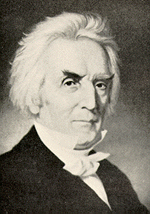Jesus H. Christ
Jesus H. Christ is a common phrase used to refer to the religious figure Jesus Christ.[1] Considered by some to be a vulgarism, it is typically uttered in anger, surprise, or frustration, though sometimes also with humorous intent.[2] It is not used in the context of Christian worship.
History

The earliest use of the phrase is unknown, but in his autobiography, Mark Twain (1835–1910) observed that it was in general use even in his childhood.[3] Twain refers to an episode from 1847, when he was working as a printer's apprentice; Smith (1994) tells the tale thus:
[Twain] recounts a practical joke a friend played on a revival preacher when Twain was an apprentice in a printing shop that Alexander Campbell, a famous evangelist then visiting Hannibal, hired to print a pamphlet of his sermon. While checking the galleys, Twain's fellow apprentice, Wales McCormick, found he had to make room for some dropped words, which he managed by shortening Jesus Christ on the same line to J. C. As soon as Campbell had read the proofs, he swept indignantly into the shop and commanded McCormick, "So long as you live, don't you ever diminish the Savior's name again. Put it all in." The puckish McCormick obeyed, and then some: he set Jesus H. Christ and printed up all the pamphlets.[4][5]
Smith suggests (1994:331-2) that "Jesus H. Christ" is a specifically American profanity, and indicates that at least in his experience it is uttered primarily by men. Quinion (2009), a British author, likewise specifies the phrase as belonging to American English.
The frequency of use of the expression – in books only – may be traced on the Google Ngram Viewer utility. It appears to have been vanishingly rare in books up to about 1930, and began a sharp ascent in frequency starting in about 1970 and continuing to the present.[6]
Stress pattern
Multiple authors emphasize the practice of placing a strong stress on the "H", relating it in various ways to expletive infixation. Thus Quinion writes:
Its long survival must have a lot to do with its cadence, and the way that an especially strong stress can be placed on the H. You might also think of it as an example of emphatic infixing that loosely fits the models of words like abso-bloody-lutely or tribu-bloody-lation.[7]
Similar remarks were made by the linguist Dwight Bolinger, who mentions "Jesus H. Christ" in a discussion of the strategies used by English speakers to add additional stresses to "highly charged words" for purposes of emphasis.[8] Horberry suggests "The strong emphasis on the H somehow improves the rhythm of its host phrase."[9] The Green's Dictionary of Slang says "the H is redundant other than for rhythm".[10]
Etymology

Using the name of Jesus Christ as an oath has been common for many centuries. But the precise origins of the letter H in the expression Jesus H. Christ are obscure. While many explanations have been proposed, the most widely accepted derivation is from the divine monogram of Christian symbolism. The symbol, derived from the first three letters of the Greek name of Jesus (ΙΗΣΟΥΣ), is transliterated iota-eta-sigma, which can look like IHS, ΙΗϹ (with lunate sigma), JHS or JHC ("J" was historically a mere variant of "I"; see J).
For how this learned-sounding abbreviation could have served as the basis for vulgar slang, Smith offers the hypothesis that it was noticed by ordinary people when it was worn as a decoration on the vestments of Anglican (i.e., in America, Episcopal) clergy.[11] The "JHC" variant would particularly invite interpretation of the "H" as part of a name.
Folk etymology
If this is the most likely origin of the "H", there remains the issue of folk etymology; that is, the sense shared by ordinary people (not necessarily historically correct) of where the H comes from. Here, a possible origin is the name "Harold"; which indeed is mentioned by Smith (1994:32) as the basis of a variant form, "Jesus Harold Christ". The "Harold" may arise from a common misinterpretation (often by children) of the phrase in the Lord's Prayer, "Our Father who art in heaven hallowed be thy name." This phrase can be mistakenly interpreted as specifying the name of the Deity ("thy name is ... "), rather than the true reading, which is "may thy name be hallowed". The confusion would arise from the phonetic similarity of hallowed (IPA [ˈhæloʊd]) to Harold (IPA [ˈhærəld]).[12]
Ian Ransom reports another folk etymology in a memoir of his childhood. The context is how local adults habitually yelled at children:
I hailed from devoted Jesus H. Christ territory. As a child, "H" was a middle initial meaning "Holy" and included to honor Jesus while his name was being used to scramble young brains into malleable balls of pure fear. Most folks bellowed the simple "Jesus Christ," so children felt privileged to hear that added "H."[13]
Facetious etymology
In a joke made by biology students, the H is said to stand for "Haploid"; the implication being that since by the doctrine of the Virgin birth Jesus had no biological father, his genome would have been inherited entirely from his mother, the Virgin Mary. For the scientific background of the joke see Ploidy.[1]
Variants
The number of variant forms, usually with "H" replaced by something longer, is vast.[14] "Jesus Harold Christ" is mentioned above. Smith notes Jesus Holy Christ, Jesus Henry Christ, and Jesus H. Particular Christ.[11] Green's Dictionary of Slang gives Jeezus K. Reist, Jesus F. Christ, Jesus H, Jesus H. Mahogany Christ, Jesus Hopping Christ, Jesus Johnnycake Christ, Jesus X. Christ, and Judas H. Christ.
For Smith, the very presence of so many spelled-out variants is part of the humor -- and blasphemy -- inherent in "Jesus H. Christ". He suggests that the H offers "the power of taking the Lord's name in vain by adding something to it that the imagination is invited to complete: What does the H. stand for? -- whatever the errant imagination proposes and the imaginer is disposed to enjoy."[15]
Notable appearances in literature
In J. D. Salinger's novel The Catcher in the Rye, the main character Holden Caulfield utters the expression when he learns that his womanizing roommate Stradlater will be going on a date with his old friend Jane Gallagher:
"How'd she happen to mention me? Does she go to B.M. now? She said she might go there. She said might go to Shipley, too. I thought she went to Shipley. How'd she happen to mention me?" I was pretty excited. I really was.
I don't know, for Chrissake. Lift up, willya? You're on my towel," Stradlater said. I was sitting on his stupid towel.
"Jane Gallagher," I said. I couldn't get over it. "Jesus H. Christ."[16]
The intensity of Holden's feelings becomes fully clear only later, after Stradlater returns from the date and Holden launches an ill-judged fist fight.
"Jesus H. Christ" is the first line of Edward Albee's play Who's Afraid of Virginia Woolf? Uttered by Martha, it is the opening salvo of a drama in which the characters express their feelings with ferocious directness.[17] In the early 1960s, the term was considered sufficiently potent as a vulgarism that for a Boston production censors required that it be replaced by a euphemism, for which Albee chose "Mary H. Magdalene".[18]
Notes
- 1 2 Adams, Cecil (1976-06-04), "Why do folks say "Jesus H. Christ"?", The Straight Dope, retrieved 2008-08-01
- ↑ The humor resides in the apparently arbitrary choice of "H", which has no Biblical justification. In addition, as Horberry (2010:26) points out, use of a middle initial would imply that "Christ" was Jesus's last name; it is not; for discussion, see Jesus. For more on humor, see "Variants", below.
- ↑ "In that day, the common swearers of the region [i.e., around his home town of Hannibal] had a way of their own of emphasizing the Savior's name when they were using it profanely". The context of Twain's remark (given here in the main text) makes it clear that he was referring to "Jesus H. Christ". Source: Harriet Elinor Smith, ed. (2010) The autobiography of Mark Twain. Berkeley: University of California Press, p. 458.
- ↑ Smith (1994:332). See also R. Kent Rasmussen, "Wales McCormick", in Critical Companion to Mark Twain: A Literary Reference to His Life and Work, Infobase Publishing, 2007, p. 786.
- ↑ Draper (1993) offers further details: the printing shop was the printing facility for the Hannibal Courier. Avoiding "J. C." required three of 16 pages to be reset.
- ↑ "Google Ngram Viewer". google.com.
- ↑ Quinion (2009)
- ↑ Bolinger (1986:84-86)
- ↑ Horberry (2010:25)
- ↑ Online edition, https://greensdictofslang.com/entry/vi5qeqa
- 1 2 Smith (1994:332)
- ↑ For web attestations of the misinterpretation, see , , , , and
- ↑ Ransom (2006:37)
- ↑ A machine search of the internet for expressions occurring in the frame "Jesus _____ Christ", both h-initial and more generally, is reported by blogger "Tensor" at .
- ↑ Smith (1994:334)
- ↑ The scene occurs in Chapter 4 of the novel (Salinger 1951).
- ↑ See, e.g., Falvey (2010:241); "almost unbearable emotional ferocity".
- ↑ Bottoms (2000:43)
References
- Bolinger, Dwight (1986) Intonation and its parts: melody in spoken English. Stanford, CA: Stanford University Press. Cited extract may be read on line at Google Books: .
- Bottoms, Stephen J. (2000) Albee: Who's Afraid of Virginia Woolf?. Cambridge: Cambridge University Press.
- Cassidy, Frederick G. (1995), "More on Jesus H. Christ", American Speech, 70: 370
- Draper, Mark (1993) "Alexander Campbell", article in Christie Graves Hamric (ed.) The Mark Twain Encyclopedia. Taylor & Francis.
- Falvey, Kate (2010) Dark humor in Edward Albee's "Who's Afraid of Virginia Woolf?". In Harold Bloom and Blake Hobby, eds., Dark Humor. Infobase Publishing.
- Horberry, Roger (2010) Sounds good on paper: How to bring business language to life. A&C Black. Cited passages may be read online at Google Books: .
- Lennox, Doug (2013) Now you know absolutely everything. Dundurn. Cited extract can be read on Google Books: .
- Quinion, Michael (2009) Why is Q Always Followed by U?: Word-Perfect Answers to the Most-Asked Questions About Language. Penguin UK.
- Ransom, Ian (2006) Waiting for the Rapture. iUniverse.
- Salinger, J. D. (1951) The Catcher in the Rye. New York: Little, Brown.
- Smith, Roger (1994). "The H of Jesus H. Christ". American Speech. 69: 331–335. doi:10.2307/455527.
External links
| Look up Jesus H. Christ in Wiktionary, the free dictionary. |
- Why do folks say "Jesus H. Christ"?, from the Straight Dope (inconclusive)
- http://www.christianorigins.com/etymology.html appears to predate the straight dope and includes also the haploid version as well as the rest
- Explanation from WorldWideWords by Michael Quinion (supports the IHC theory)
- Harold be thy name! (has an interesting connection to Epistle of Barnabas (9:6-7) (written between 70 and 190 AD) which says "The eighteen is I (=ten) and H (=8) -- you have Jesus".)